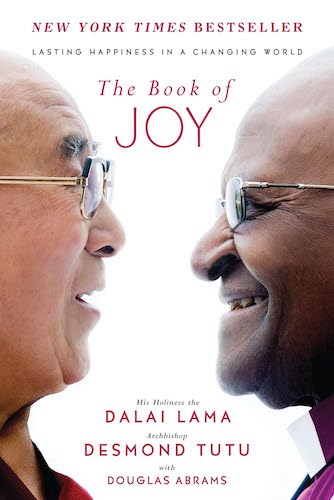The Book of Joy
Book Author: Desmond Tutu, 14th Dalai Lama, Douglas Abrams
Summary reviewed by:
Terrence Timmons
Terrence Timmons
Analyst
Bachelor of Arts (BA), University Of California, Santa Barbara 2019
With over 4 years of experience as an analyst. Terrence Timmons is committed to analyzing summaries without compromising on quality.
The Book of Joy: Summary
Unlock the secret to lasting happiness with the wisdom of two of the world's most revered spiritual leaders!
"The Book of Joy" chronicles an extraordinary encounter between the 14th Dalai Lama and Archbishop Desmond Tutu, revealing their discussions on achieving enduring happiness. These iconic figures share their life experiences, spiritual practices, and the joy they find in every day's existence, despite their encounters with great suffering and turmoil.
Underpinned by scientific research, the book delves into the nature of joy, exploring concepts from neuroscience, psychology, and philosophy. It investigates how our brains process joy and suffering, offering a nuanced understanding that validates the spiritual insights shared by Tutu and the Dalai Lama. Their credibility is bolstered by their extensive experiences of living through and overcoming adversity, alongside their roles as global spiritual leaders and Nobel Peace Prize laureates.
The book approaches personal development pragmatically, acknowledging the complexities of modern life. It promotes the idea that joy is achievable, regardless of external circumstances, focusing on internal attitude shifts and emotional resilience. Specific outcomes suggested include increased contentment, a more profound sense of purpose, and improved ability to handle life's challenges.
Key strategies for personal growth include practicing compassion, embracing gratitude, finding perspective, and cultivating a sense of humor. For example, the Dalai Lama stresses the importance of compassion in achieving a peaceful mind, while Tutu discusses how gratitude for even the smallest things can lead to a joy-filled life. The book emphasizes that these practices are not just theoretical but are actionable ways to enhance daily living.
The guide aids readers in integrating these strategies into everyday situations, offering tools, exercises, and practical steps. This includes meditation techniques to foster compassion, reflective exercises to enhance gratitude, and advice on maintaining a joyful perspective despite adversity. "The Book of Joy" acts as a roadmap, guiding individuals on a journey to uncover a more joyous and fulfilling existence, firmly rooted in the wisdom of two of the world's most joyous souls.
The Book of Joy: Genres
Non-Fiction
Self-Help
Spirituality
Philosophy
Biography
Inspirational
Eastern Philosophy
Religion and Spirituality
Personal Development
Personal Growth
Mindfulness
Leadership Management
Happiness and Wellness
The Book of Joy: Main Characters
14th Dalai Lama: A symbol of peace and spiritual leadership, embodying compassion and mindfulness. He values empathy and interconnectedness, demonstrated by his approach to teaching others about the importance of universal responsibility and kindness.
Desmond Tutu: An archbishop known for his infectious joy and resilience in the face of adversity, upholding forgiveness and inclusivity. He exemplifies the power of forgiveness through his leadership in South Africa’s Truth and Reconciliation Commission.
Douglas Abrams: The narrator and the chronicler of the dialogues, he embodies curiosity and serves as a bridge between the spiritual leaders and the reader, often asking the questions we all want to ask.
The Book of Joy: Themes
Joy as an Enduring State: The Dalai Lama and Tutu argue that joy isn’t fleeting but an enduring quality one can cultivate. They refer to their own lives filled with struggles yet abundant in joy.
The Eight Pillars of Joy: They explore these eight pillars, like compassion, generosity, and acceptance, as the foundations for lasting happiness.
Interconnectedness: Both leaders discuss the importance of understanding how we are all connected to each other and to the world, pointing to their own friendship as a testament to this concept.
Facing Suffering: Rather than ignoring or escaping suffering, the two propose that enduring hardship can often lead to profound joy and self-understanding.
Collective Responsibility: Beyond individual happiness, the book emphasizes that joy also involves a collective endeavor, underscoring their respective roles in social activism and human upliftment.
The Book of Joy: Methodology
In composing this summary, we focused on delivering an engaging experience, akin to the joy and compassion themes from the book. Our expert team delved into the narrative with the precision of a mindful meditation, extracting and analyzing the essence of joy, forgiveness, and interconnectedness. We then synthesized these insights into a concise yet comprehensive format, mirroring the practical application theme by providing actionable wisdom. This process reflects our commitment to quality and integrity, ensuring the summary not only enlightens but also resonates deeply with your journey towards a more joyous life.


The Book of Joy
Date Published: September 13, 2016
Disclaimer: As an Amazon Associate I earn from qualifying purchases.




